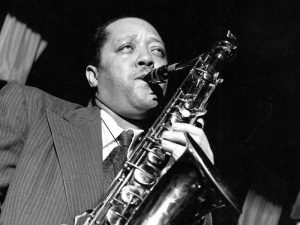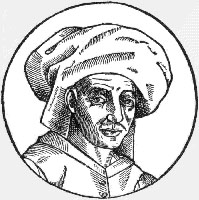Today we recognize the birth and the death of two musical masters from entirely different times and places who nevertheless, by the most extraordinary of coincidences, share the same nickname: the jazz tenor saxophonist Lester “Prez” Young and the Franco-Flemish composer Josquin “des Prez” Lebloitte.
Lester “Prez” Young

Lester Willis Young was born on August 27, 1909 – 109 years ago today – in Woodland, Mississippi. He was the consummate jazz hipster, who played “cool” long before “cool jazz” was recognized as a genre of jazz. Known in particular for his long association with Billie Holiday, Lester Young died on March 15, 1959, at the age of 49.
Josquin des Prez
Josquin des Prez (or “Desprez”; we will talk about the surname Lebloitte in a moment) was born circa 1450 and died on August 27, 1521: 497 years ago today. He was, simply, the greatest and most respected composer of his time. That he is not still a musical household name speaks to the fickleness of history and not to his music, which is superb.
Josquin was the first composer to become a legend after his death, the first to have his music widely disseminated thanks to the newly invented printing press, and thus the first composer to have his works ranked as “classics” and his oeuvre as a “canon”.
Let’s back that statement up. Martin Luther, no mean musician himself, wrote:
“Josquin is master of the notes, which must express what he desires; on the other hand, other composers must do what the notes dictate.”
Writing in 1567, 46 years after Josquin’s death, the Florentine diplomat, philologist, mathematician, and humanist Cosimo Bartoli wrote:
“Josquin may be said to have been, in music, a prodigy of nature, as our Michelangelo has been in architecture, painting, and sculpture; for, as there has not thus far been anybody who in his compositions approaches Josquin, so Michelangelo, among all those who have been active in the arts, is still alone and without peer.”
The few accounts of Josquin the “man” that have come down to us describe an arrogant and self-absorbed curmudgeon whose personality defects were forgiven because of his extraordinary talent. Like the popular image of Beethoven today, he was perceived – in his lifetime – as someone apart, a composer into whose ear whispered the divine.
His fame notwithstanding, huge gaps in our knowledge of Josquin’s life and music remain.
We’re still not sure in which decade he was born. Until the late 1990s, his date of birth was pegged as being around 1440, based on what was considered the earliest known documentary record of his existence, a roster of singers at the Cathedral of Milan dating from 1459. The roster lists one “Jodocho de frantia biscantori”, which translates “Josquin of France, young adult singer”. But recent scholarship has revealed that the singer so named was not our Josquin, but rather, someone named Josquin de Kassalia, who had been born circa 1440. As it turns out, Josquin des Prez did not arrive in Italy until the late 1480s, and today his birth date is usually given as being circa 1450, though it was probably sometime in the early to mid-1450s.
Neither are we precisely sure where Josquin was born. It might have been in what today is Belgium, in the province of Hainaut, or just across the border in or around the town of Saint-Quentin [San quen-TEN], in northern France. Both of these areas were, at the time, part of Burgundy, qualifying Josquin as being, generically, “Franco-Flemish”.
Based on various legal documents – including his will – Josquin identified himself as being a Frenchman, although there is some question regarding that as well. His name, Josquin des Prez (or Desprez; both spellings are used) is a French rendering of the Dutch “Josken van de Velde”. Some modern sources claim that Josquin’s real surname was “Lebloitte” and that “des Prez” was merely a nickname.No wonder he’s referred to as simply “Josquin”!
There are ongoing questions about the authenticity of much of Josquin’s music as well. The New Grove Dictionary of Music and Musicians lists 315 works by Josquin, and then proceeds to classify 136 of them as being of “doubtful authenticity”. (This authenticity issue is not a recent problem. In 1540, 19 years after Josquin died, the German music publisher Georg Forster joked: “A certain famous man said that Josquin produced more motets after his death than during his life.”)
The questions of authenticity and misattribution do not apply just to lesser-known works, but to some of Josquin’s most popular compositions as well. All in all, we need not be overly concerned; as Richard Scherr points out in the introduction to The Josquin Companion in regard to the shrinking number of works attributed to Josquin:
“Josquin will survive because his best music [both secular and religious] really is as magnificent as everybody has always said it was.”
Here’s what we do know about Josquin, sort of.

Around 1460, he became a choirboy at the Cathedral of Saint-Quentin in northern France. The cathedral was a major musical venue; while he was there, Josquin might even have studied counterpoint with the great Johannes Ockeghem. Alas and alack, we know little about these formative years of Josquin’s life because a fire destroyed all of Saint-Quentin’s records in 1669.
Josquin next turns up around 1475, in Aix-en-Provence, in the south of France, where he was a singer at the chapel of René, the King of Sicily and Duke of Anjou.
Things get real fuzzy for the next seven years or so. Various sources have Josquin in Paris, Ferrara, Naples, and even Hungary. Wherever he was, one thing is clear: Josquin was a very talented young man whose services were being sought out by an increasing number of rich and influential people.
By 1484, Josquin was on the international circuit, at which point the now thirty-some-odd year-old singer and composer began to leave a clear trail. From around 1484 to 1489 he was employed in Milan by the Sforza family. From 1489 to 1495, he lived in Rome and sang in the papal choir. (Here’s a fascinating tidbit. For hundreds of years, papal singers carved their names in the wall of the papal chapel: the Sistine Chapel. While restoration of the Chapel was underway in the late twentieth century, a particular graffito was discovered, one that reads: “JOSQUINJ”. If this is indeed Josquin’s signature – and in all likelihood, it is – then it constitutes his only surviving autograph!)
It was back to Milan and the Sforza family in 1498, though only until 1499, when the French King, Louis XII, invaded northern Italy and imprisoned the Sforzas. Bad news for the Sforza family, but not so for Josquin, who returned to France, now in the employ of King Louis XII.
Josquin stayed in France until 1503, at which time he was hired by Duke Ercole I of Ferrara to work in his chapel in that northern Italian city. The process by which Josquin was hired in Ferrara offers a good illustration of how sought-after musicians were engaged at that time, and the correspondence surrounding his hiring sheds rare light on Josquin’s personality and working habits.
The court at Ferrara was a wealthy one, and its Duke, Ercole (which means Hercules!) was, along with the Medicis in Florence, among the greatest patrons of the arts in all of Italy.
Ercole was particularly enamored of music, and among his courtiers were two men who served as headhunters for his musical establishment: Girolamo da Sestola and Gian de Artiganova. Human nature and the competitive spirit being what they are, a serious rivalry developed between these two, as each sought the favor of the duke and the finders fee for a successful hire. So it was that on August 14, 1502, Girolamo da Sestola urgently advised Ercole to hire Josquin while he had the chance, writing:
“My Lord, I believe that there is neither Lord nor King who will now have a better chapel than yours if Your Lordship sends for Josquin. Don Alfonso [Ercole’s son and heir] wishes this [as well] and so does the entire company; by having Josquin in our chapel I wish to place a crown upon this chapel of ours.”
Not to be outdone by Girolamo da Sestola’s support for Josquin, Gian de Artiganova urged that Ercole hire, instead, the Franco-Flemish composer Heinrich Isaac writing:
“To me [Isaac] seems very well suited to serve Your Lordship, much more so than Josquin, because he is of a better nature among his companions and will compose new works more often. It is true that Josquin composes better, but he composes when he wants to, and not when one wants him to, and he is asking 200 ducats in salary while Isaac will come for 120.”
Josquin got the job, though his stay in Ferrara was brief. When plague broke out during the summer of 1503, he took to his heels. A wise move; Josquin’s successor, Jacob Obrecht, died in Ferrara of the plague two years later, in 1505.
Josquin headed back home to the region of Condé, which today straddles the border between France and Belgium. On May 3, 1504, he was appointed provost of the church of Notre-Dame, where he headed up the musical operations for the remainder of his life. He died there in Condé-sur-l’Escaut on August 27, 1521. He was, at the time of his death, the single most celebrated composer who had ever lived up to his time.
Listen, listen, listen! Listen to Josquin’s masses; to his chansons; to his motets and instrumental compositions. As with the music of J.S. Bach and Mozart, there’s not a bad piece among them!
For those interested in hearing more about Josquin and listening to some of his MUSIC, I would direct your attention my Great Courses survey, “How to Listen to and Understand Great Music”.
And for those of you who would like to know more about the extraordinary Franco-Flemish composers who DOMINATED European music during much of the Renaissance, I would direct your attention to my Patreon page, where I will post a follow-up blog to this very post.
Music History Monday Podcast
Podcast: Play in new window
Subscribe: Apple Podcasts | Spotify | Pandora | iHeartRadio | RSS | More
Robert Greenberg Courses

How to Listen to and Understand Great Music, 3rd Edition
$349.95 – $599.95 Select options This product has multiple variants. The options may be chosen on the product page
Great Music of the 20th Century
$199.95 – $319.95 Select options This product has multiple variants. The options may be chosen on the product page
